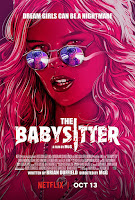The Martian
The Martian
(2015)
A Review by Grant Kanigan
Directed by: Ridley Scott
Written by: Drew Goddard, based on
Andy Weir's book
Starring: Matt Damon, Jessica Chastain,
Chiwetel Ejiofor, Jeff Daniels
Sean Bean, Michael Peña
Rating: PG
Release Date: October 2nd, 2015
 |
| Matt Damon farms space potatoes in The Martian The Martian image is the intellectual property of 20th Century Fox |
Scott's The Martian, an adaptation of Andy Weir's novel of the same name, follows astronaut Mark Watney, a botanist on one of the first manned missions to Mars. Along with five other crew members, the scientists explore and collect data. On their sixth day there, however, it becomes apparent that an oncoming Martian storm will destroy their ship if they don't evacuate the planet and head back home. When the storm hits sooner than expected, a mad rush to the ship with debris flying all around the crew, Watney is lost in between the short walk from the permanent site where he was working and the leaving ship. Blown away in the storm, the crew suspects he is dead, has no time to look for him and evacuates the planet. Once the remaining crew is at a safe distance on their ship Hermes, they notify Nasa, and begin to mourn. As the world continues to turn, and Hermes heads home, Watney wakes up, injured but alive on the surface of Mars. Completely alone. Realizing his dire situation, and the fact that it will be hundreds of days, (or SOLS on Mars, which is short for Solar Day and refers to the length of a day on Mars, which Wikipedia states is approximately, "24 hours, 39 minutes, and 35.244 seconds"), before a rescue mission can reach him, Watney begins to plot out a plan for survival with the one tool he has at his disposal - science.
In lesser hands, a story like this could have been awfully boring, or alternatively spiced up to be cinematically bombastic. Thankfully, Scott, and screenwriter Goddard stick to the tone and exactitude of Weir's novel. Like the equally compelling Apollo 13, The Martian pulls no punches. It's purely scientific, and relies on the smarts of it's main character. Unlike what my high school math teachers told me, math can be exciting; when Watney's life is on the line, his math that proves his rations will let him survive for the time being is pulse pounding. The botany behind Watney's lab that produces vegetables on Mars is equally fascinating. With a script that keeps moving and putting Watney in new and dangerous situations, The Martian would have been a cinematic achievement all it's own. With Damon filling Watney's shoes, it becomes a cinematic event. Damon is charismatic, charming, poignant and brilliant all at once. Damon has proved he's one of the best actors of his generation in years past, (Good Will Hunting, The Bourne Identity, Saving Private Ryan, The Departed, Invictus, The Talented Mr. Ripley and many more are testaments to his abilities), yet, The Martian stands out as one of his best performances in years. While there are some fantastic supporting performances from Daniels, Chastain, Ejiofor, Peña, Bean, Davis and Glover, it's largely a one man show, and Damon absolutely nails it. He's won an Academy Award in the past, and judging by his performance in The Martian, I don't think he'll retire with just one. Aside from a good cast, a brilliant script and an excellent source novel, The Martian owes a lot of it's success to one of the best directors in the business; Ridley Scott.
While some of his past films are rightly heralded as classics of sci-fi, (Blade Runner, Alien), and some as simply classics, (Gladiator), Scott hasn't made a great film since 2005's Kingdom of Heaven and hasn't made a critically successful film since arguably 2000's Gladiator. I cringe to even mention the recent and boring Exodus: Gods and Kings and am nearly throwing up remembering the god-awful The Counselor. His last foray into sci-fi, Prometheus, had an interesting premise, but an insane, illogical and downright stupid execution. So my expectations coming into The Martian were pretty low. Thankfully, Scott's reliance on his talented cast, brilliant cinematography and faith in a good story were all he needed to return to his former Glory. The Martian is quite possibly Ridley Scott's greatest achievement.
While I am loathe to mention criticisms** of a brilliant film that I thoroughly enjoyed, there are a few, (albeit minor), ones. The casting, by and large, works. Donald Glover, (who's public persona really grates at me), is pitch perfect as a scientific wunderkind. Relative unknown Mackenzie Davis, is thoroughly believable as a NASA technician, and the underrated Peña is at home in his role as the brains behind Hermes controls. However, Kristin Wiig, is majorly miscast as NASA's PR agent, and pulls the viewer out of the movie any time she's onscreen. I'm not saying she's a bad actress, but she's a really poor choice for this role. Additionally, the film does have a few scientific inaccuracies, especially the brute force of the storm at it's beginning, (in reality, Mars' worst storms are a "light breeze" ). Finally, the 3D showings of The Martian are a poor choice for the cinematography. The 3D creates a picture that is far too dark for such a cinematographically inclined film and is completely unnecessary. See this on the biggest and brightest 2D screen you can. Overall, these are minor criticisms for the most enjoyable cinematic experience I've had since Interstellar, and some I can just chalk up to decent dramatic storytelling. Science wise, it's still pretty brilliant and plausible.
In closing, The Martian is a challenging, interesting, existential, important and absolutely exciting cinematic experience that deserves to be seen on the big screen. However, its biggest achievement isn't in it's entertainment value. Scott has done what many pedagogues thought impossible, and has solved Feynman's Problem: he's made science what it truly is - interesting.
Grant's Rating: 5/5 Stars
Matt Damon in The Martian: "Do The Math"
*All words within quotes contained in this first paragraphs are Feynman's words, not mine. The source for these quotes was:
1. Feynman, Richard P., Robert B. Leighton, and Matthew L. Sands. "Feynman's Preface." Preface. Six Easy Pieces: Essentials of Physics Explained by Its Most Brilliant Teacher. New York: Basic, 2011. XXV. Print.
** While I did have some criticisms I still gave this 5/5 stars; I'm beginning to hate the rating system in general. Yeah, The Martian had a few issues, what film doesn't? That doesn't mean it wasn't the most fun I've had at the cinema in ages; if that's not worth a perfect rating, I don't know what is.



Comments